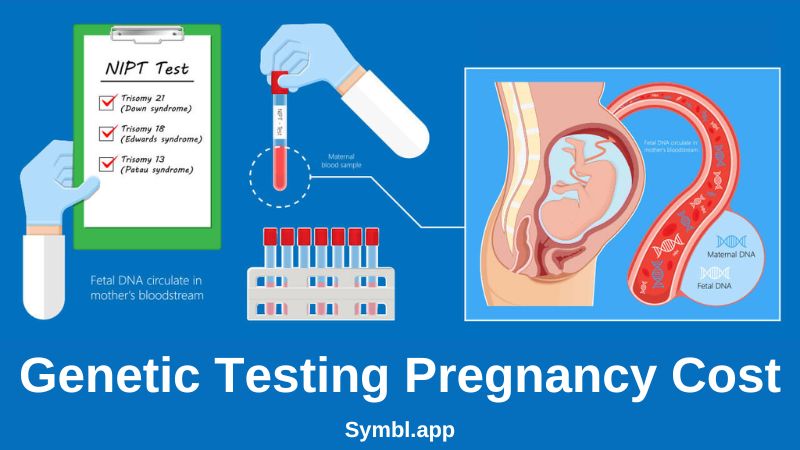In the journey of pregnancy, expectant parents are often faced with a myriad of decisions, from choosing prenatal care providers to planning for the arrival of their little one. Among these decisions, genetic testing stands out as a crucial tool for assessing the health and well-being of the developing fetus. However, alongside the medical benefits, at Symbl.app, considerations of genetic testing pregnancy cost can add complexity to an already emotional and financially significant time.
Understanding Genetic Testing

Genetic testing during pregnancy encompasses a comprehensive array of diagnostic and screening procedures meticulously designed to evaluate the genetic well-being of the developing fetus. These tests serve the vital purpose of detecting an extensive range of potential issues, including chromosomal abnormalities, genetic disorders, and other conditions that could potentially impact the health and well-being of the unborn child. Among the most prevalent forms of genetic testing during pregnancy are Non-Invasive Prenatal Testing (NIPT) and cell-free DNA testing, which offer non-invasive methods for assessing fetal genetic material. Additionally, diagnostic procedures such as amniocentesis or chorionic villus sampling provide more in-depth insights into the genetic makeup of the fetus, aiding in informed decision-making and prenatal care planning.
The Importance of Genetic Testing
Genetic testing plays a pivotal role in prenatal care by providing valuable information to expectant parents and healthcare providers. Early detection of genetic conditions allows for informed decision-making regarding pregnancy management, medical interventions, and planning for the future care needs of the child. Additionally, genetic testing can offer peace of mind to parents-to-be by identifying potential health concerns early in the pregnancy.
The Variability of Genetic Testing Pregnancy Cost
Expectant parents often grapple with the financial implications of genetic testing during pregnancy, as costs can fluctuate based on test type, testing location, and insurance coverage. Factors such as the complexity of the test and the need for additional procedures can also influence expenses. Understanding these variables empowers parents to make informed decisions regarding their prenatal care and budgeting priorities.
Non-Invasive Prenatal Testing (NIPT)
Non-Invasive Prenatal Testing (NIPT) is a prevalent screening method analyzing cell-free fetal DNA present in the mother’s bloodstream. It primarily targets common chromosomal anomalies like Down syndrome (trisomy 21), trisomy 18, and trisomy 13. The cost of genetic testing during pregnancy, specifically for NIPT, varies widely, typically ranging from a few hundred to several thousand dollars, contingent upon the healthcare provider, geographical location, and the specific scope of tests encompassed within the screening package.

Cell-Free DNA Testing
Similar to NIPT, cell-free DNA testing examines fetal DNA in the mother’s blood to screen for genetic abnormalities. The cost of cell-free DNA testing during pregnancy is comparable to NIPT and varies based on the testing provider and the extent of analysis.
Diagnostic Testing
Diagnostic testing, such as amniocentesis or chorionic villus sampling (CVS), involves obtaining fetal genetic material directly from the amniotic fluid or placenta. These tests carry a higher risk of complications than NIPT but can provide more definitive results. The genetic testing pregnancy cost for diagnostic procedures tends to be higher due to the complexity of the procedures and may range from several hundred to several thousand dollars.

Insurance Coverage
Many insurance plans offer coverage for genetic testing during pregnancy, but the extent of coverage varies widely. Some plans may cover the full cost of testing, while others may cover only part of it or none at all. It’s essential for expectant parents to review their insurance policies carefully and discuss coverage options with their healthcare provider.
Out-of-Pocket Costs
For those without adequate insurance coverage or if deductibles and co-pays apply, out-of-pocket expenses for genetic testing during pregnancy can be significant. However, some testing providers offer payment plans or financial assistance programs to help alleviate the financial burden for eligible individuals and families.
Navigating the Decision
When considering genetic testing pregnancy cost, it’s crucial for expectant parents to weigh the potential benefits against the associated costs. Open communication with healthcare providers, genetic counselors, and insurance representatives can help clarify options and alleviate concerns about affordability. Additionally, exploring alternative payment arrangements or financial assistance programs can make genetic testing more accessible to those facing financial constraints.
The Value of Informed Decision-Making
Ultimately, the decision to undergo genetic testing during pregnancy is deeply personal and should be based on a thorough understanding of the risks, benefits, and costs involved. While genetic testing can provide valuable insights into the health of the fetus, it’s essential to approach the process with realistic expectations and a clear understanding of the financial implications.
Conclusion
Genetic testing during pregnancy offers expectant parents the opportunity to assess the health and well-being of their developing baby. However, concerns about genetic testing pregnancy cost can add complexity to the decision-making process. By understanding the various types of genetic testing available, exploring insurance coverage options, and seeking out financial assistance when needed, expectant parents can make informed decisions that prioritize both the health of their baby and their financial well-being.
